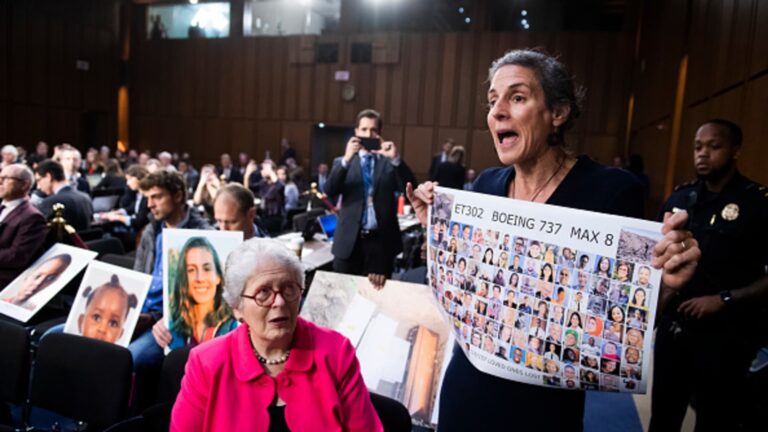A federal judge in Texas on Thursday dismissed a criminal conspiracy case against Boeing over two crashes of its 737 Max jetliner that killed 346 people, despite expressing sharp skepticism about the wisdom of the Department of Justice’s request that he toss the case.
Some families of victims of the crashes had strongly opposed the DOJ’s move in May asking Judge Reed O’Connor to dismiss the case in U.S. District Court in Fort Worth.
The DOJ, which had accused Boeing of deceiving federal regulators about a flight-control system implicated in the crashes, at the time of the dismissal request said Boeing had agreed to pay or invest $1.1 billion in fines amd compensation for victims’ families.
The dismissal comes more than a year after Boeing and the DOJ said they had reached an agreement that required the company to plead guilty and serve a term of probation.
The first crash, of Lion Air Flight 610 in Indonesia occurred in late October 2018, and the second crash, of Ethiopian Airlines Flight 302, occurred nearly five months later, in March 2019.
O’Connor, in his dismissal order, said that victim families who opposed the dismissal “are correct” that a non-prosecution agreement that the DOJ reached with Boeing “fails to secure the necessary accountability to ensure the safety of the flying public.”
O’Connor agreed with them that the agreement “disregards the need for Boeing to be subject to independent monitoring.”
But the judge wrote that he did not have authority to deny the dismissal request even though he “disagrees with the Government that dismissing the criminal information in this case is in the public interest.”
“The Court recognizes that ‘in every political institution a power to advance the public
happiness involves a discretion that may be abused.,’ ” O’Connor wrote, citing one of the Federalist Papers.
“Nevertheless, poor discretion may not be countered with judicial overreach,” he said.
Boeing on Wednesday reached settlements in three lawsuits filed by families of victims of the second crash, after a jury had been selected for the trial of one of those cases in Chicago federal court.
CNBC has requested comment from Boeing about the dismissal of the criminal case.
The DOJ criminally charged Boeing in January 2021 with conspiracy to defraud the United States for the company’s alleged obstruction of the Federal Aviation Administration’s evaluation of the Max’s maneuvering characteristics augmentation system.
At the same time that case was filed, the DOJ said it had entered into a deferred prosecution agreement with Boeing, which effectively suspended the case’s prosecution.
But in May 2024, the DOJ told O’Connor that Boeing had breached the deferred prosecution deal by “failing to design, implement, and enforce a compliance and ethics program to prevent and detect violations of U.S. fraud laws throughout its operations.”
In July 2024, the DOJ and Boeing submitted a plea agreement to O’Connor that called for the company to plead guilty.
O’Connor rejected the plea agreement because its terms “were not in the public interest,” the judge noted in his order Thursday.
In May, months after President Donald Trump entered the White House for a second term, the DOJ asked O’Connor to dismiss the case altogether.
O’Connor in his order questioned the DOJ’s rationale for the non-prosecution agreement that was part of the dismissal request.
“The Government now believes that Boeing can be trusted to select a compliance consultant
because Boeing has made ‘meaningful progress in improving its anti-fraud compliance and ethics programs,’ ” O’Connor wrote.
“In summary, the Government’s position in this lawsuit has been that Boeing committed crimes sufficient to justify prosecution, failed to remedy its fraudulent behavior on its own during the [Deferred Prosecution Agreement] which justified a guilty plea and the imposition of an independent monitor, but now Boeing will remedy that dangerous culture by retaining a consultant of its own choosing.”
“Given Boeing’s history related to this case (and the Government’s continued failure to gain Boeing’s compliance), the Movants are correct that this agreement fails to secure the necessary accountability to ensure the safety of the flying public,” O’Connor wrote.
The judge also wrote that he found the DOJ’s claim that there was “uncertainty and litigation risk” from going to trial in the case to be “unserious.”
“The Government has a confession from Boeing, signed by the CEO and Chief Legal Officer, admitting to all the elements of the conspiracy charge against it in the DPA,” O’Connor said. “As such, the assertion that there is a legitimate risk that Boeing would be acquitted at a trial lacks support.”

